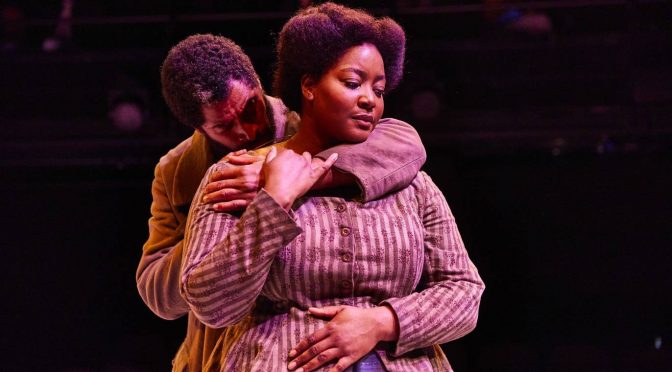Winsome Pinnock’s play tackles the subjects of race and history with ambition and ability. Splitting the action between the 19th century and the present day, we see JMW Turner painting and contemporary creatives at work on a film about him. As both sets of artists engage with the issue of slavery, Pinnock’s dialogue with history becomes vivid and urgent.
There’s trouble among the filmmakers as a director and his star, Lou – a particularly grand role for Kiza Deen – argue over artistic integrity. Meanwhile, the story of a young artist and his inspiring teacher (characters you immediately get behind, carefully portrayed by Anthony Aje and Rochelle Rose) brings another level to the debate about the role of art and education. The commentary on creativity and society is intelligent and provocative.
Such vivid questioning of whether art can only “bear witness” or whether it can do more make the historical part of the play pale slightly. It’s a shame. The plot is strong: an adventure for Turner and a tragedy for a black sailor called Thomas make compelling stories. The latter includes a love story especially well portrayed by Karl Collins and Rose. But the politics Pinnock wants to explore sound hollow in her well-drawn characters’ mouths.
It isn’t that people didn’t question slavery or race during this period – it’s just the effort to state these debates in our terms. Maybe how the 19th century would phrase the argument is too unpalatable or, more likely, incomprehensible. Pinnock makes the debate smart and relatable. It’s good to credit the past with intelligence while interrogating it. But we can’t pretend that the dialogue doesn’t jar now and again.
Any reservations disappear after the interval as Rockets and Blue Lights really takes off: increasingly ambitious, full of surprises and even more political. Bringing together periods in time is well done – with dance and ghostly visitations. The use of music, composed and directed by Femi Temowo, is inspired. Arguments about the legacy of slavery, and injustices both past and present, lead to strong imagery from Pinnock.
Having the cast double up between the historical periods ensures impressive performances – and suggests connections between characters that make the mind boggle. Director Miranda Cromwell’s staging is strong, switching effortlessly between the time periods and handling distressing scenes with power and tact. This fine balance is particularly impressive – there is none of the “torture porn” that Lou fears might appear in the film she is working on. Considerable sophistication is the undercurrent for the whole show.
Until 9 October 2021
Photo by Brinkoff / Moegenburg

